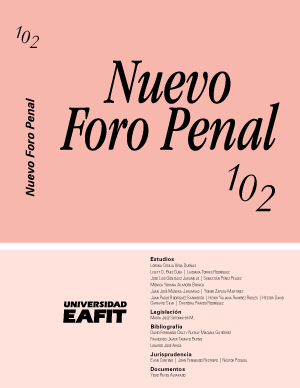The right to non-self-incrimination in Colombia: a right to not tell the truth?
Main Article Content
Keywords
Right to non-self-incrimination, right to remain silent, oath
Abstract
In this article we analyze the scope and limits of the right to non-self-incrimination in relation to false statements in the Colombian legal system and in comparative law. Initially, we characterize the historical background, the nature, and the content of the right to non-self-incrimination and non-incrimination of relatives. Then, we analyze the doctrinal positions on the right of defendants to make false statements on matters entailing criminal responsibility. Finally, we analyze the ethical and legal foundations of the right to non-self-incrimination and argue that the rights to defense and personal integrity may be the foundation of the right of the defendant to make false statements.
Downloads
References
Celis-Vela, Duber Armando. “La tesis sobre la especificidad de la interpretación constitucional”. International Journal of Constitutional Law 19, n°4, (2021): 1261–1290. Disponible en: https://doi.org/10.1093/icon/moab104
Durán Muñoz, Geovanni. “El derecho humano a la no autoincriminación”. Revista del Centro Nacional de Derechos Humanos, n°38 (2020): 53-75.
Escobar Veas, Javier. “Un análisis comparado de la jurisprudencia del Tribunal Europeo de Derechos Humanos sobre el derecho a no autoincriminarse”. Revista Brasileira de Direito Processual Penal 8, n°2, (2022): 869-899.
Gómez del Castillo y Gómez, Manuel. El comportamiento procesal del imputado. Silencio y falsedad. Barcelona: Bosch, 1979.
Green, Mark. The Privilege’s Last Stand: “The Privilege Against Self-Incrimination and the Right to Rebel Against the State”. Brooklyn Law Review 6, n°3 (1999): 627-716.
Helmholz, Richard, “Origins of the Privilege against Self-Incrimination: The Role of the European Ius Commune”, New York University Law Review 65, (1990): 962-990.
Hoyos-Castañeda, Ilva Myriam. “El juramento y el deber-derecho de honrar el nombre de Dios”. Dikaion, n°4, (1995): 105-118.
Kurniawan, Zahri, Wahyudi, Ilham, Tisnanta, H.S. “The Right Non Self-Incrimination and Epistemology of Criminal Witnesses”. Fiat Justisia: Jurnal Ilmu Hukum 14, n°4, (2020): 363-380.
Lamberigts, Stijn. “The privilege against self-incrimination. A Chameleon of Criminal Procedure”. New Journal of European Criminal Law 7, n°4, (2016): 418-438.
Levy, Leonard. Bosch. 2° ed. Oxford University Press, 1986.
Malatesta, Framarino Dei. Lógica de las Pruebas en Materia Criminal. Bogotá: Editorial Temis, 1964.
Muñetón, Juan Camilo. “La negativa a realizarse la prueba de embriaguez con base en el derecho a no autoincriminarse”. Nuevo Foro Penal, n°85 (2015): 79-121.
Ormazabal Sánchez, Guillermo. “El derecho a no incriminarse. Análisis de ciertos aspectos problemáticos”. Revista del CEC, n°7, (2018): 3-43.
Ramírez Jaramillo, Juan David. El agente encubierto frente a los derechos fundamentales a la intimidad y la no autoincriminación. Medellín: Editorial Universidad de Antioquia, 2010.
Redmayne, Mike. “Rethinking the Privilege Against Self-Incrimination”. Oxford Journal of Legal Studies 27, n°2 (2007): 209-232.
Ríos-Patios, Gino Augusto. “¿Tiene el imputado el derecho a mentir? El derecho a la verdad y el deber de declararla”. CES Derecho 10, n°2 (2019): 642-653.
Rodríguez Piñeres, Eduardo. Estudio sobre el secreto profesional. Bogotá: Temis, 1980.
Corte Constitucional colombiana. Sentencia C-782 de 2005. M.P. Alfredo Beltrán Sierra.
Corte Constitucional colombiana. Sentencia T-547 de 1993. M.P. Alejandro Martínez Caballero.
Corte Constitucional colombiana. Sentencia C-301 de 2012. MP. Jorge Ignacio Pretelt Chaljub.
Corte Constitucional colombiana. Sentencia C-062 de 1998. MP. Carlos Gaviria Díaz
Corte Constitucional colombiana. Sentencia C-621 de 1998. M.P. Gregorio Hernández Galindo.
Corte Suprema de Justicia colombiana. Sala Penal. Sentencia 14043 de 2002.
Corte Suprema de Justicia colombiana. Sala Penal. Auto AP30920 de 2009.
Corte Suprema de Justicia colombiana. Sala Penal. AP 31127 de 2009.
Corte Suprema de Justicia colombiana. Sala Penal. Auto AP7066 de 2016.
Corte Suprema de Justicia colombiana. Sala Penal. Auto del seis de abril de 2005.
Corte Suprema de Justicia colombiana. Sala Penal. Auto 46429 de 2015.
Corte Suprema de Justicia colombiana. Sala Penal. Sentencia SP4703 de 2020.
Corte Suprema de Justicia de Estados Unidos. Apfelbaum v United States, 445 U.S. 115 (1980).
Corte Suprema de Justicia de Estados Unidos. Brown v Walker, 161 U.S. 591, 637 (1896).
Corte Suprema de Justicia de Estados Unidos. Murphy v Waterfront Commission of New York Harbor 378 u.s. 52 (1964).
Corte Suprema de Justicia de Estados Unidos. Miranda v. Arizona, 384 U.S. 436 (1966).
Corte constitucional colombiana. Sentencia C-822 de 2005. MP. Manuel José Cepeda Espinoza.
Tribunal Europeo de Derechos Humanos. Allen v. United Kingdom (2002).
Tribunal Supremo de España. Sala de lo militar. Sentencia STS 847 de 2000.
Tribunal Europeo de Derechos Humanos. Funke v France (1993) 16 EHRR 297, 326.

